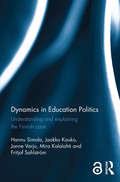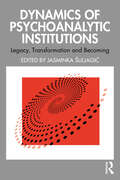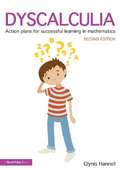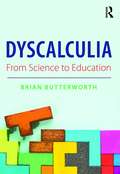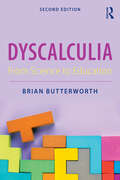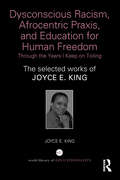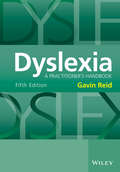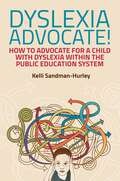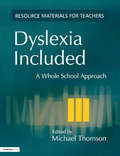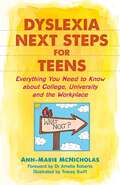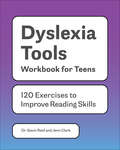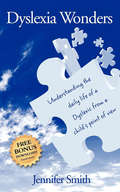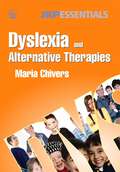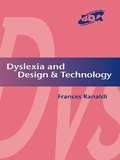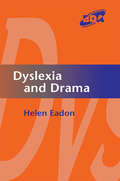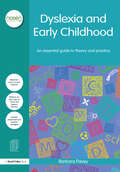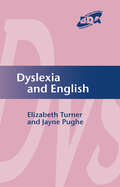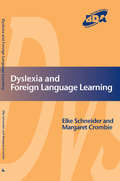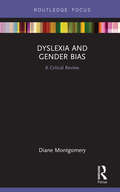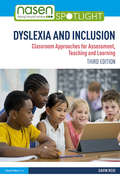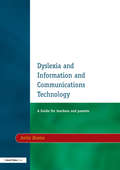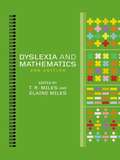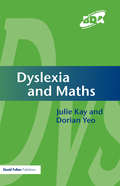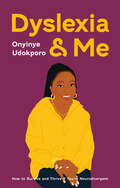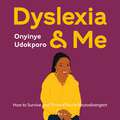- Table View
- List View
Dynamics in Education Politics: Understanding and explaining the Finnish case (Comparative And International Education: Diversity Of Voices Ser. #37)
by Hannu Simola Jaakko Kauko Janne Varjo Mira Kalalahti Fritjof SahlstromDynamics in Education Politics: Understanding and Explaining the Finnish Case introduces a new theoretical framework characterised as Comparative Analytics of Dynamics in Education Politics (CADEP). Albeit the topicality of comparative research is obvious in the current era of global large-scale assessment, with its concomitant media visibility and political effects, comparative education is still suffering from certain methodological deficits and is in need of robust theorisation. Focusing on relational dynamics between policy threads, actors and institutions in education politics CADEP seriously considers the phenomena of complexity, contingency and trans-nationality in late-modern societies. In this book CADEP is applied and validated in analysing the "Finnish Educational Miracle" that has been attracting attention in the educational world ever since they rocketed to fame following the PISA studies during the 2000s. This book will open up opportunities for mutual understanding and learning rather than just celebrating the exceptional circumstances or sustainable leadership. Areas covered include: The analytics of dynamics in education politics The dynamics of policy making and governance The dynamics of educational family strategies The dynamics of classroom culture It is vital for humankind to be able to learn from each other’s successes and failures, and this applies in education, too. This book is thus a valuable read for anyone interested in the education system and wanting to shape the learning environment.
Dynamics of Psychoanalytic Institutions: Legacy, Transformation and Becoming
by Jasminka ŠuljagićDynamics of Psychoanalytic Institutions provides a thorough appraisal of the current state of psychoanalytic groups and how they might move forward under fraught conditions, representing the outcome of many years of work by the Institutional Matters Forum (IMF).This erudite book presents the thoughts, experiences, reflections, and outcomes of the IMF, a long-standing working group of the European Psychoanalytical Federation (EPF). Organisational and group dynamic issues have a great influence on the life of psychoanalytic societies. However, they are often lived through as part of institutional and professional daily lives or retold as part of a history, marked with frequent conflicts, disruptions, splits, and impasses. This book recognises the need to explore the structure, culture, organisation, and unique characteristics of psychoanalytical organisations and to provide the space and tools for reflection. Consisting of seven psychoanalysts from seven different countries, the IMF group charts the origins of analytic societies, explores group mentality, and considers the impact on the global experience of war and the Covid pandemic on psychoanalytic institutions.
Dyscalculia: Action plans for successful learning in mathematics
by Glynis HannellBased on expert observations of children who experience difficulties with maths this book gives a comprehensive overview of dyscalculia, providing a wealth of information and useful guidance for any practitioner. With a wide range of appropriate and proven intervention strategies it guides readers through the cognitive processes that underpin success in mathematics and gives fascinating insights into why individual students struggle with maths. Readers are taken step-by-step through each aspect of the maths curriculum and each section includes: Examples which illustrate why particular maths difficulties occur Practical ‘action plans’ which help teachers optimise children’s progress in mathematics This fully revised second edition will bring the new research findings into the practical realm of the classroom. Reflecting current knowledge, Glynis Hannell gives increased emphasis to the importance of training ‘number sense’ before teaching formalities, the role of concentration difficulties and the importance of teaching children to use strategic thinking. Recognising that mathematical learning has a neurological basis will continue to underpin the text, as this has significant practical implications for the teacher.
Dyscalculia: From Science To Education
by Brian ButterworthDyscalulia is caused by developmental differences in the structures and patterns of activation in the brain. Affected learners require timely and tailored interventions, informed and shaped by neurological findings. In this ground-breaking text, Professor Butterworth explains the latest research in the science of dyscalculia in a clear non-technical way. Crucially, he shows that dyscalculia is caused by a core deficit in the ability to accurately and swiflty represent the number of objects in a set, an ability that underpins learning arithmetic, and clearly differentiates dyscalculia from other forms of early maths learning difficulties. Butterworth uniquely links research to pedagogical practice, to explain how science can be used for the identification of dyscalculia, and for the development of strategies to best help affected learners acquire arithmetical competence. The text provides robust interventions that focus on helping pupils to strengthen their ability to process numerosities and link them to the familiar number symbols, counting words and digits. It shows that science has clear and specific implications both for assessment and intervention. A landmark publication for the dyscalculia community, Dyscalculia: From Science to Education will become an essential resource for teachers, professionals, parents and sufferers, as well as for university courses that include specific learning disabilities.
Dyscalculia: From Science to Education
by Brian ButterworthIn this new edition of his best-selling text, Brian Butterworth explains the very latest research in the science of dyscalculia in a clear, non-technical way. Crucially, he shows that dyscalculia is caused by a core deficit in the ability to accurately and swiftly represent the number of objects in a set, an ability that underpins learning arithmetic, and clearly differentiates dyscalculia from other forms of early mathematical learning difficulties.This new edition includes a review of the new evidence for effective intervention, examines new research on the role of memory, intelligence, and how they interact with the core deficit. With new chapters on number sense, the arithmetical brain, governmental changes around the world, and evaluations of new interventions, this invaluable text is fully supported with a wide selection of online useful resources and courses. Butterworth uniquely links research to pedagogical practice, to explain how science can be used for the identification of dyscalculia, and for the development of strategies to best help affected learners acquire arithmetical competence. The text provides robust interventions that focus on helping pupils to strengthen their ability to process numerosities and link them to the familiar number symbols, counting words, and digits. It shows that science has clear and specific implications both for assessment and intervention.A landmark publication for the dyscalculia community, this second edition of Dyscalculia: From Science to Education will become an essential resource for teachers, professionals, parents, and sufferers, as well as for university courses that include specific learning disabilities.
Dysconscious Racism, Afrocentric Praxis, and Education for Human Freedom: The selected works of Joyce E. King
by Joyce E. KingA dynamic leader and visionary teacher/scholar, Joyce E. King has made important contributions to the knowledge base on preparing teachers for diversity, culturally connected teaching and learning, and inclusive transformative leadership for change, often in creative partnership with communities. Dr. King is internationally recognized for her innovative interdisciplinary scholarship, teaching practice, and leadership. Her concept of "dysconscious racism" continues to influence research and practice in education and sociology in the U.S. and in other countries. This volume weaves together ten of her most influential writings and four invited reflections from prominent scholars on the major themes the work addresses. In the World Library of Educationalists, international scholars themselves compile career-long collections of what they judge to be their finest pieces—extracts from books, key articles, salient research findings, major theoretical and/or practical contributions—so the world can read them in a single manageable volume. Readers will be able to follow the themes and strands of their work and see their contribution to the development of a field.
Dyslexia
by Gavin ReidThe main purpose of this new edition is to incorporate the most recent theoretical and practical research in the field of dyslexia and literacy and present it in a user friendly format for Practitioners. It refers to the most recent government reports on literacy and dyslexia in a number of countries such as, USA, UK, Canada, New Zealand and Australia. Each chapter has a summary at the start and, at the end, key points and 'points to consider' are looked at.
Dyslexia Advocate!: How to Advocate for a Child with Dyslexia within the Public Education System
by Kelli Sandman-HurleyThis straightforward guide provides the essential information for parents and advocates to understand US law and get the right educational entitlements for a child with dyslexia. Using case studies and examples, this book demonstrates clearly how to apply the Individuals with Disabilities Education Act (IDEA) to the unique requirements of a dyslexic child. It offers simple, intelligible help for parents on how to coordinate successfully with their child's school and achieve the right services and support for their dyslexic child; up to and beyond getting an effective Individual Education Plan (IEP). Dyslexia- Decoding the System is an invaluable tool for parents trying to negotiate a complex legal system in order to get the best outcome for their child. It is an essential guide for anyone who is considering acting as an advocate for a child with dyslexia.
Dyslexia Included: A Whole School Approach
by Michael ThomsonThis practical book provides teachers with techniques and suggestions to help dyslexic pupils. Written by a team of experienced practitioners who work in a specialist school, it offers clear guidance and tried and tested strategies to help those who need support in this area. The book addresses reading and spelling difficulties and also other aspects of pupils' learning difficulties, including: accessing the curriculum; dyspraxia and motor development problems; learning mathematics; the use of ICT; developing phonological coding; and understanding dyslexics' behaviour. Teachers and teaching assistants working in specialist and mainstream primary and secondary schools should find the book useful. It is also relevant to those doing specialist courses in dyslexia.
Dyslexia Next Steps for Teens: Everything You Need to Know about College, University and the Workplace
by Ann-Marie McNicholasWritten for 14+ year olds, this accessible book empowers young people with dyslexia to make a smooth transition to college, university or the workplace. An engaging and informative guide, it will help you plan and make decisions about the next stage of your education or employment.Ann-Marie McNicholas, who has worked with young people with dyslexia for many years, answers the questions that you will have as you plan for life at university or college. She covers the differences between school and college and university, lists the different types of dyslexia assessment available and gives you simple, tried-and-tested tips to help you to manage your time, your workload and your revision. Beyond information about further and higher education, the book is full of advice on preparing for the next stage in your life, such as moving into the workplace.A must-read pocket guide for teenagers with dyslexia and an essential resource for parents, teachers, SENCOs, career advisers, and anyone else involved in supporting learners with dyslexia to make a successful transition to further education and the world of work.
Dyslexia Tools Workbook for Teens: 120 Exercises to Improve Reading Skill (Learn to Read for Kids with Dyslexia)
by Gavin Reid Jenn ClarkBoost confidence and reading skills with dyslexia tools for teensReading comprehension is a crucial skill for students to practice, especially students with dyslexia. The Dyslexia Workbook for Teens provides practice and encouragement for kids ages 12 to 16, with 125 activities that focus on learning big words, prefixes and suffixes, word recognition, language fluency, and more.The dyslexia tools in this book support teens as they:Learn independently—Teens can comfortably practice whenever and however they prefer with this collection of dyslexia tools they can work on by themselves.Explore a range of exercises—Keep students interested with word charts, puzzles, fill-in-the-blanks, and other fun activities.Build self-assurance—As teens get better and faster at these exercises, they'll see for themselves how much they're capable of and feel more confident in their reading and language skills.Help middle and high school students in overcoming dyslexia with this book of skill-boosting activities.
Dyslexia Wonders: Understanding the Daily Life of a Dyslexic from a Child's Point of View
by Jennifer SmithA Child Knows More Than You Think. Written by a 12 Year Old Child With Dyslexia…Jennifer is struggling through school. Kids tease her, teachers question her ability. Her own family doesn't even understand her. Listen to her story as she tells it in her own words. Learn how she struggles from being different from her peers, how she reacted when she finally found out why, and how she overcame the trials dyslexia brought into her life. Parents, teachers, tutors, and family members will benefit from the lessons in this remarkable story. &“I Have Dyslexia: This Does Not Define Who I Am!&” Jennifer Smith For the one in every five children who has dyslexia and the millions of other&’s who struggle to read at their own grade levels and for their parents, teachers, tutors, families and friends.
Dyslexia and Alternative Therapies
by Maria Chivers'A good book about how alternative therapies can help dyslexia. It mentions each therapy individually and explains what it is, how it works, how many sessions are needed, who will benefit, and if it can be done at home.' - Education Otherwise This comprehensive book offers clear and balanced information on a range of alternative therapies for individuals with dyslexia, dyscalculia, dyspraxia or ADHD. The author provides an overview of each therapeutic option, method of use and case examples, covering nutritional supplements, massage, acupuncture and hypnotherapy, among others. She also includes contributions from experienced alternative therapists, offering an insider's view of what works and what does not. Her objective approach will enable the reader to make an informed choice from among the many available options. A bibliography and a list of useful contacts are also provided. This book is a key resource for anyone interested in exploring alternative therapy approaches to dyslexia and related difficulties, particularly for parents of people with dyslexia, dyslexics themselves and the professionals who work with them.
Dyslexia and Design & Technology
by Frances RanaldiThis practical guide will help busy teachers and learning support staff present the design technology curriculum in a way that will make it accessible to dyslexic pupils and create a more flexible and positive learning environment. Drawing upon her experience as a designer, teacher and mother of two dyslexic children, and also as a dyslexic learner herself, the author: dispels myths about the difficulties faced by dyslexic learners explains the variety of learning difficulties that they experience highlights the help that they need to access their potential gives an insight into issues relating to craft and design offers flexible strategies and solutions that can be used in the classroom or workshop.
Dyslexia and Drama
by Helen EadonFirst Published in 2005. Routledge is an imprint of Taylor & Francis, an informa company.
Dyslexia and Early Childhood: An essential guide to theory and practice (nasen spotlight)
by Barbara E. PaveyTaking a developmental approach, this accessible text addresses the ever increasing interest in identifying the characteristics of dyslexia in young children and reflects on the best way to reach and support these learners. Drawing upon current research, the author considers our current understanding of dyslexia and calls upon best practice to advise professionals, students and family members alike who seek to fulfil the potential of young children with, or showing the signs of, dyslexia. This book considers key topics explored in current best practice and dyslexia research, including: the importance of the role of speaking, hearing and understanding language dyslexia in relation to other languages and orthographies dyslexia and overlapping characteristics, particularly dyspraxia the role of play identifying and assessing dyslexia in the early years. Adopting a dyslexia-friendly position, Barbara Pavey acknowledges the ethics associated with a social model of disability, so that the focus is upon modifying teaching and learning, and respecting the views of children and parents throughout. This book includes assessment and practice strategies, good practice points, helpful ideas, first-hand narratives of dyslexia, pointers for further reading, resources and online tools, and will be of enormous practical use to anyone supporting a young child with potential or diagnosed dyslexia.
Dyslexia and English
by Elizabeth Turner Jayne PugheThe difficulties dyslexic students experience in the English mainstream classroom and present to their English teacher are examined in detail in this book.
Dyslexia and Foreign Language Learning
by Elke Schneider Margaret CrombieOffering strategies and techniques for teaching modern foreign languages - an often severely challenging subject for pupils with dyslexia - this book is specifically designed to meet the needs of the busy subject specialist teacher looking for guidance on supporting pupils.
Dyslexia and Gender Bias: A Critical Review
by Diane MontgomeryProviding an overview of the various understandings and approaches taken to dyslexia over the last 100 years, this text considers why men have traditionally taken the lead in dyslexia theory and research, whilst women have often been confined to practice. Exploring how and why particular pathways in dyslexia theory, research and practice were historically pursued, whilst other potentially successful methods were not, Montgomery argues that gender bias has played a significant and often obstructive role in the development of our identification and understanding of dyslexia. Explaining why women and girls have often been under-represented in dyslexia clinics and in research, chapters trace the contributions made by dyslexia pioneers, analyse current problems within education and research systems, and document widespread patterns of misogyny and gender discrimination in the field. Montgomery links dyslexia history, current research paradigms and transgender experiences, to ask whether assumed male superiority has disadvantaged dyslexic learners, and whether it will continue to do so. In the process, she presents a new trajectory for research and practice. A timely exploration of the impacts of gender discrimination on research and education, this text provides essential insight into the subtle impacts of sexism on dyslexic learners.
Dyslexia and Inclusion: Classroom Approaches for Assessment, Teaching and Learning (nasen spotlight)
by Gavin ReidNow in a fully updated third edition, this book will equip all teachers with the necessary knowledge of dyslexia in order for it to be effectively understood and managed in the mainstream classroom. Offering comprehensive guidance and support strategies, this resource is based around Reid’s signposts for successful inclusion: acknowledging differences; recognising strengths; understanding what is meant by inclusion; planning for practice; and ensuring attainable task outcomes. In identifying the key issues of inclusive practice, the book supports teachers as they strive to fulfil the social, educational and emotional needs of children with dyslexia. Key features of the new edition include: Up-to-date references to current research and legislation New sections on evidence-based teaching strategies, developing independent learning and communication with parents Detailed information on wider reading and additional resources, including websites, apps and software available to support learners with dyslexia With practical strategies and resources designed to meet the needs of the busy classroom teacher, this book is crucial reading for educators and education students looking to help students with dyslexia reach their full potential.
Dyslexia and Information and Communications Technology: A Guide for Teachers and Parents
by Anita KeatesEffective use of ICT can enhance many dyslexic pupils' access to the curriculum, but it has to be used appropriately. This book will be useful to all teachers, teaching assistants, SENCOs and parents who are keen to have practical advice on how to help a child in this way. Full of strategies and suggestions that are based on the author's extensive classroom experience, this accessible book is suitable for the ICT novice and more advanced user alike. The book has been fully updated to guide the user through the maze of hardware and software currently available, identifying those most suitable for different Key Stages and curriculum subjects as well as providing ICT solutions to the problems of assessing and screening for dyslexia.
Dyslexia and Mathematics
by Elaine Miles T. R. MilesIn this revised and fully updated second edition of the classic bestselling text, the formidable team of expert contributors, inluding Professor Tim Miles OBE, draw on their extensive experience in the field. The outcome is a wealth of material based on individual case studies supported by practical and accessible teaching strategies. The new material includes: * discussion of the latest thinking in the field - ideas on dyscalculia* information from a survey of primary school children* guidance on suitable testing material* innovative contributions on practice. The long awaited second edition of Dyslexia and Mathematics is unique in terms of its coverage and authority, and is a must-buy text for teachers, student teachers and special needs co-ordinators.
Dyslexia and Maths
by Dorian Yeo Julie KayThis concise text helps the reader to understand why dyslexics find maths difficult and offers practical ideas for supporting them most effectively. It explains which areas of maths dyslexics tend to have particular difficulty with, assesses current teaching philosophies and methods, describes a framework of general learning principles that allow dyslexics to make progress in maths, and outlines a number of specific and effective teaching recommendations. The book helps teachers at primary and secondary levels to better understand the maths performance of dyslexics and gives them an overview of the ways in which dyslexics can best be supported in all aspects of maths learning.
Dyslexia and Me: How to Survive and Thrive if You’re Neurodivergent
by Onyinye UdokporoThroughout my life I have been told directly and indirectly that dyslexia is found in particular people... [In fact] dyslexia can be found in someone like me. It isn't just 'okay' but something to be proud of. This book has been written because I want people to know that dyslexia can be found in people of every colour, creed, or circumstance.In this book, rising star entrepreneur Onyinye Udokporo shares her story of growing up dyslexic in a society where neurodivergence was always presented as a white male issue.Onyinye discusses her experience of being diagnosed at 11 years old, starting a business the following year, gaining a scholarship to a prestigious boarding school and going on to complete two degrees by the age of 22, while also being honest about the difficulties she faced throughout including with bullying and anxiety. She shares the tips she picked up over the years for thriving with dyslexia and the strategies she used to overcome her difficulties in reading and writing well, staying organised and speaking with confidence.Illuminating wider issues of systemic racism in the educational sector and providing a timely reminder that dyslexia can be found in any community and culture, this is an empowering story of surviving and thriving in the face of adversity.
Dyslexia and Me: How to Survive and Thrive if You’re Neurodivergent
by Onyinye UdokporoThroughout my life I have been told directly and indirectly that dyslexia is found in particular people... [In fact] dyslexia can be found in someone like me. It isn't just 'okay' but something to be proud of. This book has been written because I want people to know that dyslexia can be found in people of every colour, creed, or circumstance.A survival guide on being young and dyslexic by inspiring rising star entrepreneur and speaker Onyinye Udokporo, combining her own personal story with political and cultural insights, and practical tips and advice.In this audiobook, rising star entrepreneur Onyinye Udokporo shares her story of growing up dyslexic in a society where neurodivergence was always presented as a white male issue.Onyinye discusses her experience of being diagnosed at 11 years old, starting a business the following year, gaining a scholarship to a prestigious boarding school and going on to complete two degrees by the age of 22, while also being honest about the difficulties she faced throughout including with bullying and anxiety. She shares the tips she picked up over the years for thriving with dyslexia and the strategies she used to overcome her difficulties in reading and writing well, staying organised and speaking with confidence.Illuminating wider issues of systemic racism in the educational sector and providing a timely reminder that dyslexia can be found in any community and culture, this is an empowering story of surviving and thriving in the face of adversity. (P) 2022 Jessica Kingsley Publishers
